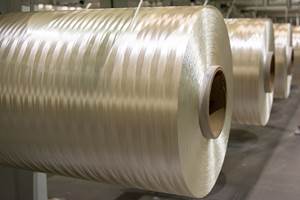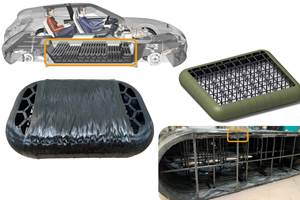NTPT researches discontinuous fiber tubes
North Thin Ply Technology is collaborating with the Ecole Polytechnique fédérale de Lausanne - Swiss Centre of Technology and other partners to demonstrate proof of technology of tubes made with discontinuous carbon fiber.
NTPT (North Thin Ply Technology, Renens, Switzerland), specialists in Thin Ply prepregs, preforms and parts as well as automation, are collaborating with the Ecole Polytechnique fédérale de Lausanne - Swiss Centre of Technology (EPFL, Lausanne, Switzerland) and other partners, to further demonstrate proof of technology of carbon fiber tubes made with discontinuous carbon fibers.
NTPT has successfully produced high-performance carbon fiber tubes using their patent-pending method for manufacturing tubes with Thin Ply prepreg materials since 2016. Offering composite design engineers the freedom to position fiber plies at any angle and at any point in the tube’s length or thickness, NTPT’s breakthrough winding technology provides high-resolution engineering capability.
In order to fully understand the behavior and potential of such tubes, the company is partnering with EPFL, the leading European technical university and specialist in research and technology transfer work in the field of composite materials. This latest project, NTPT and EPFL’s third significant collaborative research program, reinforces their joint commitment to enhancing the performance of advanced composite structures.
The four-year study focuses on discontinuous fiber composite tubes for high performance applications, referring to NTPT’s proprietary manufacturing process for high performance tubes, which offer tighter tolerances, greater repeatability, as well as a high level of customization and design freedom. The key innovation of the study is to move the potential of tubular discontinuous fiber composites to a new level. It will create a strong scientific knowledge base, and develop the technical tools required to create design rules, optimize the material and continue to look at the cost effectiveness of the process, thereby enabling NTPT to better communicate its advantages to the performance market sectors, and to expedite the initial stages of new projects and product development.
Carbon fiber composite tubes can be used in various market sectors and applications, such as thin wall tubes in the aero sector as struts or control arms, automotive drive shafts, masts and booms in the marine sector, rollers and cylinders for industrial applications, as well as for the performance sports sector, in particular golf, for which NTPT is establishing a new business under the TPT Golf brand. On a larger scale the technology may be applicable to the automated manufacture of wind turbine spar and root components. Two components will be developed through the course of the study: one short term project is a windsurf mast which will be developed over an 18-month period in conjunction with professional windsurfer Tristan Algret; and the other is a 3-year project with a leading aerospace company to develop tubular structures for UAVs.
“We are embarking on an exciting project that is the obvious next step in our research and development into high performance composite tubes. We have established a sound platform from which to launch our parts business, and we are excited about the progress made this year,” says James Austin, CEO, NTPT. “Now is the time to move into this next stage of research, which will allow us to more easily provide customer-specific responses to new applications and inquiries, and enable us to move into the prototyping stage of new products more quickly. We are confident that customers will be benefiting from the early stage findings within the first year.”
Related Content
Natural fiber composites: Growing to fit sustainability needs
Led by global and industry-wide sustainability goals, commercial interest in flax and hemp fiber-reinforced composites grows into higher-performance, higher-volume applications.
Read MorePlant tour: Joby Aviation, Marina, Calif., U.S.
As the advanced air mobility market begins to take shape, market leader Joby Aviation works to industrialize composites manufacturing for its first-generation, composites-intensive, all-electric air taxi.
Read MoreBio-based acrylonitrile for carbon fiber manufacture
The quest for a sustainable source of acrylonitrile for carbon fiber manufacture has made the leap from the lab to the market.
Read MoreTU Munich develops cuboidal conformable tanks using carbon fiber composites for increased hydrogen storage
Flat tank enabling standard platform for BEV and FCEV uses thermoplastic and thermoset composites, overwrapped skeleton design in pursuit of 25% more H2 storage.
Read MoreRead Next
Plant tour: Daher Shap’in TechCenter and composites production plant, Saint-Aignan-de-Grandlieu, France
Co-located R&D and production advance OOA thermosets, thermoplastics, welding, recycling and digital technologies for faster processing and certification of lighter, more sustainable composites.
Read MoreDeveloping bonded composite repair for ships, offshore units
Bureau Veritas and industry partners issue guidelines and pave the way for certification via StrengthBond Offshore project.
Read MoreVIDEO: High-volume processing for fiberglass components
Cannon Ergos, a company specializing in high-ton presses and equipment for composites fabrication and plastics processing, displayed automotive and industrial components at CAMX 2024.
Read More
























